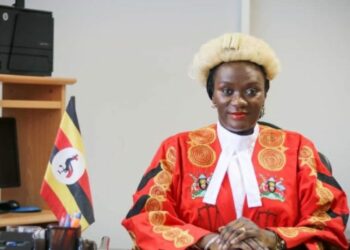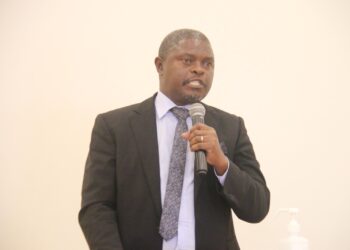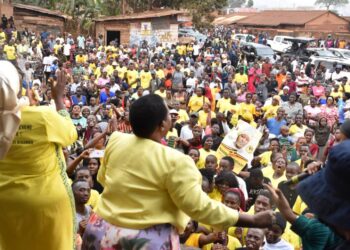Lt Gen Muhoozi Kainerugaba is the Senior Presidential Advisor on Special Operations. In his eight-year tour of duty as Special Forces Commander (SFC), he built a Force that today lives out true to its stated mission. Below are excerpts from an interview by Stephen Bwire:-
You served as Commander of SFC for a period of eight years. How would you describe your tour of duty?
It was a challenge because we had objectives we had to meet that the President had set for us. So it was a bit of a challenge to meet those objectives. But I think we performed well. You remember it transitioned from PPU [Presidential Protection Unit] in 1986-2003, then it became PGB [Presidential Guard Brigade], SFG [Special Forces Group] and finally SFC [Special Forces Command]. The PGB or PPU was more focused on providing presidential security and had a limited role in other missions. But now with emergence of SFG and SFC, there is an expanded role, besides providing presidential security, in terms of supporting UPDF specialized operations.
You have been able to build a powerful and versatile special operations force in line with the SFC stated mission; how were you able to achieve this?
We were able to achieve this first of all because of the President’s support and guidance at all times. You know he is very engaged in security issues and keeps a keen eye on the military. So with his guidance and support we were able to make the Force achieve the objectives that he had set. But also the SFC has good officers that are dedicated to their duties; thus a combination of these two factors- the President’s support and guidance as well as disciplined and dedicated officers made it [SFC] more manageable.
What are some of the most enduring assignments you have undertaken during your soldiering career?
The greatest achievement was pacifying the country. When we joined in the late 1990s, the security situation in Uganda was very bad. We had LRA in the north which was quite powerful. I remember one of my assignments was against [late LRA second-in-command] Vincent Otti in the north, and at that time Otti was moving with a force of 300 rebels. LRA was a powerful force terrorizing the populations, people wouldn’t live in their villages; you remember there were close to 1.5 million IDPs [Internally Displaced Persons]. So we decisively defeated and expelled the LRA in August 2006 and that was a big achievement. And then we engaged the ADF. At that time it was PGB but the unit that carried out the mission was the Commando Battalion. Actually it was the first and last operation, because after that operation the ADF was neutralized in March 2007. They never came back to militarily disrupt Uganda.
And how did you relate with your forces during your assignments?
I always try to understand my soldiers because to me they are heroes. So I always try to understand their thinking which is quite different from civilian thinking, and then I have to explain to them the mission and why we have to achieve it. I think that is why they like me because I never try to impose myself on them but I make whatever assignments we have a collaborative effort. I think that is the best way to deal with soldiers.
There are now ongoing discussions at policy level of government to transform the SFC into the third UPDF service, after the Land and Air Forces. If enacted, how do you think this will shape the future of Uganda’s special military operations?
I think it will be helpful because we are talking about increased capacity. The important thing is that based on the history of where this forces started from, it’s now a fact that special operations are an important element in modern warfare not only in Uganda but worldwide. The fact that the UPDF is recognizing this is an important factor in the development of the entire force, and this is a big milestone. So if the SFC is elevated to service level then that will increase its capabilities to achieve more, and this [it being a service force] will come with certain advantages that currently they don’t have.
Talk more about your new assignment as Senior Presidential Advisor on Special Operations. What does this job entail?
The establishment of that office is part of our appreciation for the broadness of a term known as national security. National security is not only about military security but an all-encompassing concept; it involves economic security, cyber security; you see hackers causing problems worldwide, they can bring down power networks, can bring down banks, revealing vital information and this can cause a big security crisis. So Uganda’s understanding of national security is now broad; we are saying that much as we need a stronger military but also we need other elements of national security strengthened. There is also environmental security with climate change being a big security threat. When floods and drought cause famine it can cause huge tension in the country and this goes against the very essence of national security. You people in the media are also part of national security because you create tension in the country and it goes against national development.
How would you rate the ongoing efforts of professionalizing our military forces/UPDF?
I think it’s going well. Am impressed that a number of young people are joining the forces. When we were younger,people weren’t interested in joining the military. Now we have graduates flooding recruitment centres whenever there are calls for recruitment. When we were joining being educated was a problem, you would hardly find graduates getting interested in joining the military,but now the situation has changed. There are regular courses unlike in the late 1980s and early 90s when there was no training. But now at every step of a military officer’s career there is a course.
You are passionate about soldering. What inspired you to join the Army?
I grew up in the army, I grew up with soldiers all my life. I remember when we were in Tanzania in exile we used to live next to late Tito Okello. In fact I used to call him ‘Uncle Tito’. When we returned in 1979 I remember Mzee [President Yoweri Museveni] was a soldier and he used to have Tanzanian escorts around him. Tito Okello was also a senior member of the command structure of UNLA [Uganda National Liberation Army]. Then I was often in company of young officers like my uncle Saleh, late Fred Rwigyema, late Fred Rubereza.
Many people would look at your record in service as an exemplary record. We have seen leaders who have messed up things by virtue of the positions of power and privileges they have. At your level you have a lot of opportunities that would have diverted you from the main objective. What advice would you give to those leaders at all levels so as they could perform with a sense of duty and discipline?
For me what has guided me is a sense of patriotism; strong love for my country. Some people thought it was a strange thing for me to join the army; they were asking why I was joining the army of all things and thought I should perhaps go to London to enjoy a high class life there. But for me I wanted to go to Gulu, Atiak, Lira and generally other places of Uganda. I wanted to know my country.I wanted to know more about our history as a nation; where this country was and where it is now. As compared to other countries in Africa Uganda was the country which was mostly in chaos. But right now Uganda is peaceful and well-governed. So we have to ensure that we don’t reverse the gains which we have achieved, and this is what every leader at whatever position should work for.
You wrote a book “Battles of the Uganda Resistance”. What inspired you to write this book?
The idea for writing started when I was in my course in America at Fort Leavenworth Command and General Staff College. They had given us an assignment to write a paper on force management; we were writing about our individual countries’ manpower management. So I tried to go to the library to get some books on how other countries were managing their forces especially in Africa and I couldn’t find any. So during one of the holidays when I returned around 2007, I went to the library and bought a couple of books including those written by Mzee, the late Ori Amazi Ondoga, I don’t think Gen Pecos Kutesa had written his book by then. I got a number of books and donated them to the library when I returned to Fort Leavenworth. By then most of the books we had on shelves were autobiographies; people narrating their lives. That got me thinking that why don’t I also bring a purely academic military perspective on the NRA war. When you read that book it’s not your usual book, but a military officer analysing the war and breaking it down as a military exercise with in-depth analysis. It’s not just story-telling.
Do you hope to write another book soon?
Now that I have enough time I would want to write another book especially on the LRA. I don’t think that enough people know that this insurgency of LRA was a difficult insurgency to defeat. We need to do a deeper understudy and analysis of this LRA war and why it was such a difficult group to defeat.
This article first appeared on thepubliclensug.com
Do you have a story in your community or an opinion to share with us: Email us at editorial@watchdoguganda.com











